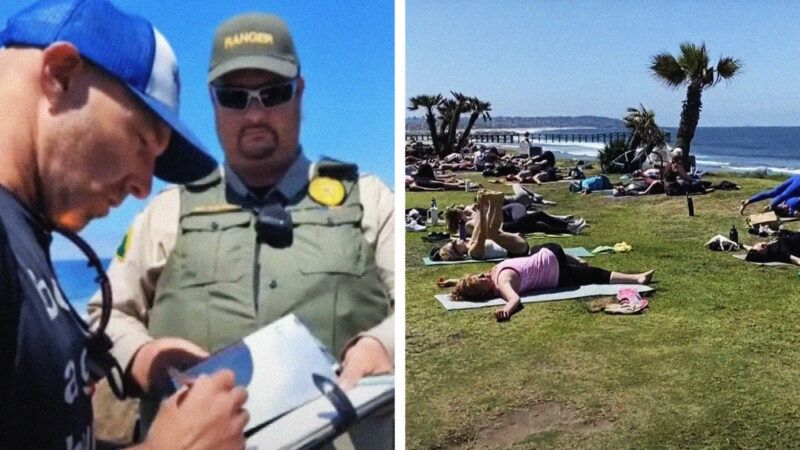San Diego Is Cracking Down on Groups Exercising Outside Without a Permit
A revision to the municipal code made it illegal for groups of four or more people to convene in public spaces for commercial recreational activities without a government stamp of approval.

They come in packs. They're often crunchy. They're chameleons: a downward-facing dog one moment, a cobra or child the next. (What versatility!) They do handstands and breathe peacefully. And we can't have any of that.
At least, not on public land. By "they," I'm referring to the world of yogis. And by "we," I mean the city of San Diego, which revised its municipal code in March to prevent groups of four or more people engaged in commercial recreational activities—yoga, fitness classes, dog training, etc.—from convening in public spaces without a permit.
Law enforcement officers are zeroing in on rogue gatherings, breaking up beachside classes before they begin and issuing tickets to the teachers. And despite the city's emphasis on "commercial" activities, park rangers are also busting those groups who meet with no cost of admission. "It's really tragic that the city would take away the opportunity to come to a class for free, to be outside in a public park, and to enjoy nature," Amy Baack, a yoga instructor, told San Diego's KGTV station. And despite what might be the gut reaction here—"Just get a permit!"—it appears the city isn't making that easy: "We are perfectly willing and ready to get a permit," Baack added, "if the city would allow it."
The law was originally tailored to target permitless food vendors. Reasonable people can and should debate the necessity or utility of preventing people from buying hot dogs from someone without a stamp of approval from government bureaucrats. But it would seem even more questionable to apply that concept to people who voluntarily meet by the water to do some stretching. Conjuring safety concerns there requires an active imagination.
Indeed, San Diego says the core issue at stake is safety. Officials expanded the code, which went into effect March 29, "to ensure these public spaces remain safe and accessible," a city spokesperson said in a statement. What danger these groups pose while transitioning from, say, bridge pose to wheel pose remains unclear.
The idea that the code provision ensures accessibility, meanwhile, is richly ironic, as it explicitly excludes from access those taxpaying San Diegans who have the audacity to work out with other people sans a permit. That they have gathered together as opposed to separately, or to do a specific activity as opposed to something nebulous, should not suddenly necessitate approval from the government.
Whether or not the rule will survive is up in the air: An attorney for a group of yoga instructors on Friday served a cease-and-desist letter to city officials. Whatever the case, it's an example of the government implementing a solution in search of a problem, which didn't actually exist until city leaders created it.


Show Comments (41)